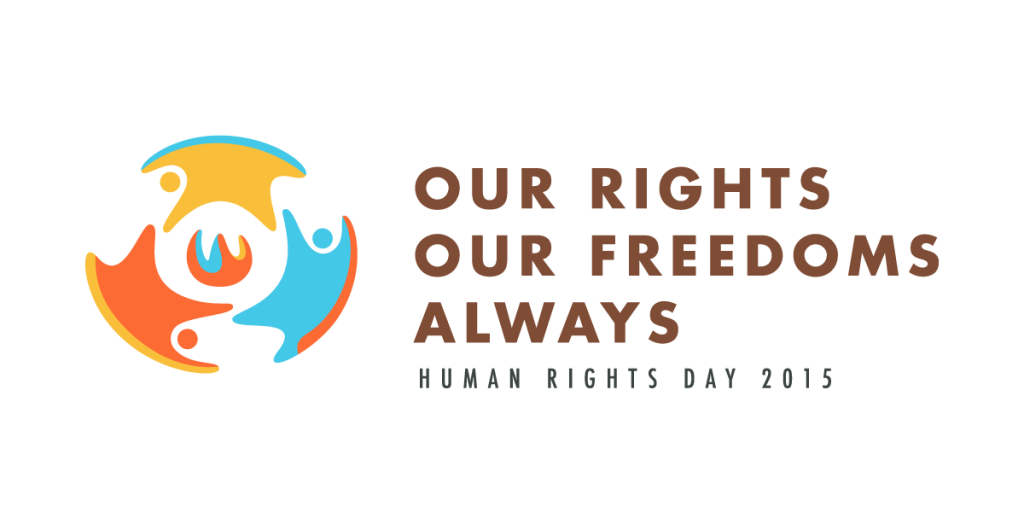As the supervising Tutor of the Human Rights Law Clinic of the Hugh Wooding Law School in Trinidad and Tobago, I had the opportunity to give opening remarks at the law school’s official event in commemoration of Human Rights Day, on December 1oth, 2015.

This year, the Clinic hosted a public speaking competition, which featured participating students from both the first and second year groups of the law school. Each topic featured in the competition, couched or concerned a human rights issue in Trinidad and Tobago or the Caribbean.
All protocols having already being observed, good morning!
“Our Rights, Our Freedoms Always”. That is the theme chosen by the United Nations Human Rights Office for World Human Rights Day, 2015.
Rights and Freedoms: these seem like basic concepts, but very often, the discourse that occurs on events such as World Human Rights Day, is very academic. There are many groups and individuals that work to promote the advancement of human rights in the society, but very often and especially in small societies such as our various Caribbean jurisdictions, this well-intentioned group becomes perceived by the public as out-of-touch, inaccessible or out-of-reach, and even elitist.
Even among law students, this concept of ‘human rights’ triggers a notion that a career in the area of human rights can only be achieved by working for an international organization and having a ‘foreign experience’ by being posted somewhere else.
We at the Hugh Wooding Law School have attempted to dispel this myth though the creation of the Human Rights Law Clinic in 2004. We are an extension of the law school’s Legal Aid Clinic, and I think that it is important on occasions such as this to remind you of the mission statement of the Council of Legal Education:
“To facilitate the development of competent legal practitioners for the region who, appreciating their responsibilities as members of an honourable profession and recognizing the needs of their socio-economic environment, are inspired in the pursuit of excellence, the maintenance of high ethical standards, the promotion of social justice and the strengthening of the rule of law.”
In other words, we train advocates. We train them to use their skills as future attorneys-at-law, right here at home. And we try to instill in them that using these skills is a very big responsibility, and that it must be taken seriously.
So education and advocacy remains our two-fold objective, and this public speaking competition for students of the law school falls within the objectives of what we try to do.
Students of the Human Rights Law Clinic have gone out into primary and secondary schools throughout the term, to plant seeds in younger minds about rights and freedoms and themselves become catalysts of change through advocacy and education.Our students break-down complex legal concepts and present them in a format for the average person, in articles published with the title “Law Made Simple” in a daily newspaper.
And our students also complete practical community-based projects with a human rights and educational aim. This year we have four such projects: The Innocence Campaign, which examines the reasons for and effects of child abuse in this country, and the measures that we can put into place to stop it from occurring; Hope For The Homeless, which brings attention to a group in our society that is either forgotten or neglected, and for this project our students did not remain in the vicinity of the law school or gravitate towards the capital city, but rather travelled week after week to the city of San Fernando to work with homeless persons there; we are also conducting a Social Experiment to test how people react to persons with disabilities and the infrastructure that is in place for disabled persons in this country. Our students navigated though several public spaces, getting a first-person perspective on what everyday life it is like for someone who is disabled; and we’ve created a Board Game, which presents human rights concepts in an innovative, fun and interactive way for the youth of the Caribbean.
So we have oral, written and community advocacy, but in 2015, we cannot discount the impact of technology, and it is for this reason that the Clinic has embraced digital advocacy as well, not only to highlight the work that our students have completed, but to actually inform the public on their rights and freedoms, through Facebook, Instagram, Snapchat, YouTube and other platforms. Our students no longer produce a written report of their projects for assessment in this Clinic, but instead they produce short video content, which we publish to the public on our social media channels.
So having regard to the theme of World Human Rights Day, “our rights, our freedoms, always”, I am very happy and proud to say that the law school’s Human Rights Law Clinic has and continues to play a critical role in the advocacy of those rights and freedoms.
Having said that, on behalf of the Principal of the Hugh Wooding Law School, I welcome you to our second annual public speaking competition. Please sit back and enjoy the presentations, and I hope that you will all learn something from the eight speakers today.
The featured image used in this post is by University Of Essex, used under an Attribution-NonCommercial-ShareAlike 2.0 Generic Creative Commons license. Visit University Of Essex’s flickr photostream.




